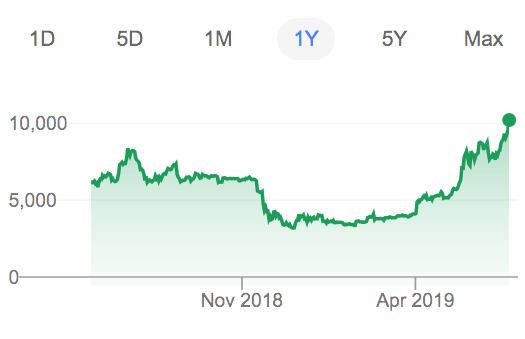Here’s Tyler Cowen, discussing the proposed new Facebook cryptocurrency called “Libra”:
4. We are told “The association does not set monetary policy. It mints and burns coins only in response to demand from authorized resellers.” Maybe, of course there are hundreds of years of debate on that one, google “real bills doctrine,” noting that here we have a semi-dominant private issuer rather than a perfectly competitive banking system. The association policy on interest rate spreads, floats, and credit, of course, can end up being a monetary policy de facto. I don’t want to prejudge this one against Libra, since to me the validity of the real bills doctrine is a genuinely open question, but it is worth noting that most economists would not agree with the doctrine in most settings.
I’m no expert on cryptocurrencies, but here’s my best guess on this issue, FWIW. It will be helpful to begin with a discussion of how the “real bills doctrine” applies to three situations:
1. Is the creation of private bank money inflationary under a gold standard?
2. Is the creation of government fiat money backed by valuable assets inflationary?
3. Is the creation of private currency substitutes inflationary under a fiat money regime?
In each case, you need to consider the impact on the supply and demand for the medium of account (gold in the old days, currency today.)
In my view, the creation of private bank money was slightly inflationary under the old gold standard. This is because the creation of private bank money slightly reduced the global demand for gold. But only slightly. (It did not directly impact gold supply.) Thus you might view the old real bills doctrine as being false, but approximately true.
In my view, the creation of government fiat money is inflationary, even if backed by valuable assets. There are other opinions, for instance check out the views of Mike Sproul. My view is that the creation of fiat money tends to boost the supply of money more rapidly than the demand for money, because currency is not a close substitute for other financial assets. This is obviously less true if you are talking about the creation of interest bearing reserves. For simplicity, it’s easier to evaluate this issue in terms of the pre-2008 monetary regime, where the monetary base was 98% currency. In that case, I don’t believe the real bills doctrine is even approximately true.
In my view, the creation of private bank money substitutes is not inflationary under a fiat money regime. While it’s true that these substitutes would slightly reduce the demand for government fiat money (currency), the effect would be small. And even if the effect were large, I’d expect the central bank to offset it with a reduction in the monetary base. To the extent that it impacted monetary policy, the issuance of private currency substitutes would merely reduce seignorage.
This last case seems the most applicable to Libra. I’d expect this system to slightly reduce seignorage, but not too much. Seignorage does not come from the creation of interest bearing reserves, it comes from the creation of currency. Most US currency is held for the purpose of hiding wealth. I expect the demand for $100 bills to remain high, even after Libra.
I suspect that if Libra turns out to be highly successful then it will be a much bigger threat to banks and credit card companies than to the Fed. But I have no idea whether it will be successful.


